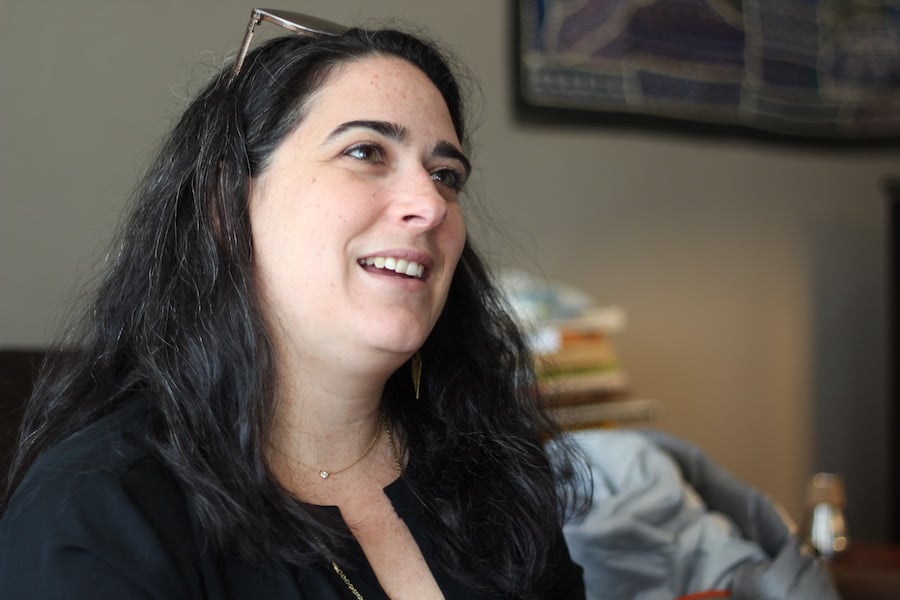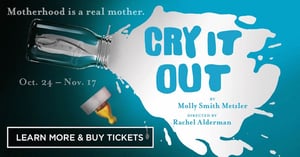
Hartford | Arts & Culture | Theater | Hartford Stage

| Rachel Alderman. Lucy Gellman File Photo. |
The first time New Havener Rachel Alderman heard reviews of Mollie Smith Metzler’s Cry It Out, it wasn’t from fellow directors. It was from new moms who finally saw themselves onstage. Breast pumps, leaking body fluids, adult diapers and all.
Now, she is bringing that story to Hartford Stage, where the play runs from Oct. 24 through Nov. 17. In Metzler’s unvarnished tale of postpartum and new parenthood (there are belly-laughs in there too), Alderman said that she’s found a show that resonates with her not just as a director and artistic associate at the theater, but also as a parent to two young boys.
“This is the show that hits closest to home of something I’ve ever worked on,” she said in an interview Tuesday, in the midst of daycare drop-off and her daily commute to Hartford. “This is very, very present. I wake up in the morning, and it’s chaos as I try to get out of the house. There are children that wander into my room at two in the morning. I get less sleep because of it.”
“I'm freaking exhausted," she continued. "And then I go to rehearsal, and I’m like, this rehearsal process is a beautiful kind of balm for me and for other parents in the room.”
Set in suburban New York, Cry It Out follows three adults—two moms and a dad—as they try to navigate new parenthood, burrowing into their frustrations, fears, and very real exhaustion with surprising humor and equal honesty. Metzler does not pull punches: almost immediately, two moms who have met for coffee—in their front yards, because that’s where you meet for coffee if your baby is sleeping—are exchanging notes on baby names, social isolation, and their slowly healing bodies.

There’s searing humor, but also a weight to the words, which refuse to place motherhood (and more broadly, parenthood) in the clean and happy place to which it is often relegated in popular culture. Here, Metzler’s characters talk about how exhausted they are. They’re straightforward about non-moms not getting it, and sometimes about moms not getting it either. They lean on their village and also acknowledge its complexity. The mommy wars peek out their heads and come galloping in.
In doing so, Metzler reveals the idea of a “fourth trimester” of pregnancy, in which a baby is adjusting to life in the world—and so too are its parent or parents. The title comes from the eponymously named and equally controversial sleep training method, in which parents let their babies cry themselves to sleep.
For Alderman, the work was and continues to be a powerhouse of postpartum truth-telling. While she had read written work true to her parenthood experience before—she praised Anne Lamott’s 1993 Operating Instructions as particularly candid—she found that books were few and far between, and depictions in popular media were fewer. She recalled seeing Duchess Kate Middleton walk out of the hospital in a shift dress after the birth of her first child, and thinking of how she’d been made up to look like her body had snapped right back into shape after pushing out a small human being.
Then Cry It Out premiered in Louisville in 2017, and began popping up at theaters around the country. When it reached Chicago’s Northlight Theatre last year, Alderman started hearing about the work from friends she’d known when living and working in the Windy City, in a time before any of them had children. Not just directors and theater people, but parents.
“A bunch of my friends who were moms themselves were saying ‘you have to see this show,’” she recalled. “It’s doing what other parenthood shows haven’t done before. It embraces the complexities of parenthood.”
Alderman didn’t see the show—to this day, she hasn’t seen a production outside of the one she is directing—but she read it. And reread it. In the dialogue, flecked with a humor of sheer exhaustion, she saw herself: a mom just trying to hold it together, even with an immensely supportive partner who shared responsibilities. Last year, it was one of the works she put on the table for the 2019-2020 season. When it was chosen for the season’s second show—she praised Artistic Director Melia Bensussen for “really championing” the work—it felt like it was hitting the theater right on time.
“It doesn’t stand on a soapbox or preach,” she said. “It’s not shouting anything in capital letters. It’s just laying out what we all experience. It’s using our funniest and our most poignant and most vulnerable moments as parents.”
As the play opens in Hartford, Alderman said she sees it as part of a small but mighty group of works that accurately reflect parenthood, instead of painting it in rosy hues. It joins recent television shows like Workin’ Moms and The Letdown that depict moms struggling with the limits of maternity leave (which is still longer in both programs, because they don’t take place in the U.S.), childcare, inevitable gender imbalance, healing bodies, and places to pump breast milk at work.
“That’s the reality new moms have, which is that your body is still draining fluids and your organs are trying to get back to where they’re supposed to be,” Alderman said, noting Amy Schumer’s real-life photos in postpartum hospital underwear. “The validation that that offers to women is huge, unlike the narrative that you should somehow get it back together.”
But more broadly for the director—and perhaps for the audience as well—it helps tell a true, very timely story of parents who are expected to make room for a society that keeps breaking down, from their prenatal and postpartum hospital visits to their workplaces to strained relationships and childcare.
In the United States, there’s still no guarantee of paid maternity leave, the customary 12 weeks of which clock in at a fraction of the time other countries give women. In late 2018 and into this year, investigations from the New York Times revealed pregnancy discrimination in many of the country’s largest workplaces, including those ostensibly supporting women and reproductive health. And meanwhile, women in the U.S. are going into childbirth with an alarming and rising rate of maternal mortality and morbidity.
But say one has that baby and gets through that fourth trimester—the clock keeps ticking. There’s the constant and precarious puzzle of childcare, with which Alderman said she struggles despite a supportive partner, network of friends and neighbors, and two sets of parents nearby. There’s the strain it puts on one’s partnership (if one is not doing this alone, which the play also explores), on one’s job, on one’s sanity. And there’s also the weight, sometimes crushing and sometimes the happiest heaviness, of falling in love with a tiny human in the midst of it all.
Cry It Out takes that on, Alderman said. It grapples with distance, isolation and postpartum depression. It opens up about the invasive, surgical procedures that have become common in the U.S., where over a quarter of annual births are now performed by cesarean section. And it acknowledges just how broken the system is as the play's characters struggle to make sense of balance.
“Many [work]places are in a bind, because the system overall puts them in a position where three months feels like a sacrifice,” she said. But the reality is that the family unit is a given, and not the thing that needs to be worked around. Like, that is not the thing that should be on the back burner.”
“We need to shift the lens,” she added. “We all claim that we work to support our families and our loved ones … when really everything should be in service to the community and the things that make up the community. It seems funny that this very natural thing, that the thing that has always been the constant since the beginning of time, is the thing we are expected to rearrange.”
But if the reality is hard to swallow, Metzler tells it with humor and honesty that makes this story, of a group of adults in a yard that could be your yard, worth listening to. In an effort to welcome audiences that include parents, the theater has teamed up with Christ Church Cathedral to offer free child care at matinee performances on Nov. 2 and 3. Alderman already feels good about the program: she test drove it with her husband and friend’s during the theater’s season opener last month.
“Parenthood is a real gut check,” she said. “And motherhood, it’s a constant work in progress. You don’t really arrive anywhere. You’re just trying to get better at recognizing where a shift needs to happen.”
Molly Smith Metzler's Cry It Out runs at Hartford Stage from Oc. 24 through Nov. 17. Tickets and more information are available here.

